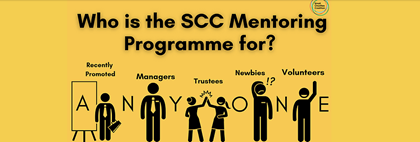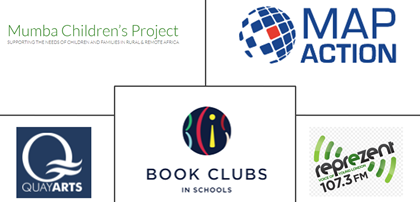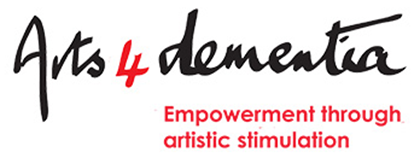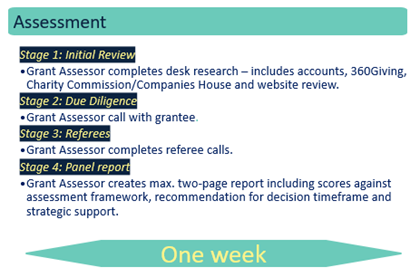Introduction
Welcome to Issue 2 of the Newsletter dedicated to our Company’s philanthropic efforts. The scope is broadly: updates on a selection of our pro bono assignments and the work of the Company’s charitable fund. (Ed: You can still find Issue 1 here).
Recent Grants by the Charitable Fund
At the most recent meeting of the Trustees of the Charitable Fund two grants were considered and approved, as follows:
Sea Cadets - The organisation is well known to the Company and to the Trustees. This request was to fund a range of training equipment for First Aid training of adults. This is a “mission critical” subject, because the organisation is not allowed to run events without sufficiently qualified first aid adults. Adult turnover and 3-year expiry of qualifications means that there is always a need to deliver the first aid training. The equipment required was not consumable or disposable – and therefore an investment:
- Resuscitation manikins x 12, £1500 which should last for several year. The current (slightly dilapidated) equipment (4 manikins) has been in service since 2010.
- New up to date St John/Red Cross First Aid manual x 200, £800
- Training Projectors x 2, £600 – the training course format and content is dictated to Sea Cadets by Army Reserve, who are the licensed provider of our courses, and is reliant on-screen presentation to augment the practical aspect of the training. Current equipment is coming to the end of their 8-year life.
- Projector screen x 2, £200 – as above.
- Total + £3,600 plus some consumable items.
Total requested and granted £4,000.
Small Charities Coalition - Established in 2008, SCC’s Mission is to provide small not for profit organisations with the relevant information, advice and support to help them deliver what they want. SCC’s focus is on small charities (70% are < £100k turnover) and new charities / start-ups. More information here.
This request relates to the Mentoring Service offered by the charity. Attempts to rationalise the service and its provision were thwarted by the advent of Covid in March 2020, but this also provided the opportunity to take stock. Working with furloughed staff from Volunteering Matters (well known to the Company) SCC redesigned the mentor programme, to make it a more meaningful experience for all parties. The new programme will also provide more support for mentors and ensure that there is a unified recruitment and support programme for them. This aims to develop a best practice framework, further resources and guidance to ensure small charities get the very best from the mentoring programme.

The request was to enable the administrative functions of the mentoring role (checking applications, taking up references for mentors, setting up meetings between mentors and mentees and sending out surveys) to be delivered through the Kickstart Programme via a young person. On the face of it, this request was simply to provide part funding for a young person for a year. However the reality is that the organisation is building a new capability with the aim of demonstrating its viability. A specific requirement, built into the role description, is to establish solid data about the social impact of the work. A detailed approach has been established using objective and subjective surveys of beneficiaries to establish the outcomes achieved by the mentoring service.
SCC is an example of a charity that helps charities. As such it represents good leverage for the use of our funds. The request is clearly based on building a sustainable capability which should have multiplier effects across a segment of the 3rd sector which the Company does not currently address via the pro bono programme. Total requested and granted £6,000.
(Ed – Read more about our own Mentoring programme here).
Pro Bono Round-up
After an initial flurry of activity during the early stages of the pandemic in 2020, things quietened down and in fact there was little demand during the second half of last year. However as we have returned to a more normal state, demand has picked up again and the following summarises those requests that have been progressed into pro bono assignments over the past few months. It's worth reminding everybody that not every request turns into an assignment. Some fall by the wayside and some are simply trying it on but about 90% of requests do result in an assignment. It is pleasing to note that several new volunteers have stepped up over recent months and we thank every one of our volunteers for their efforts as noted below.

Bob Harris and Malcolm Green ran a successful business development workshop for a charity called “Map Action”, which provides geospatial expertise to humanitarian situations in the belief that this can greatly improve outcomes for the people affected in areas suffering natural disasters and so on. About us – MapAction
Steve Mayhew, Philip Taylor and Kevin Hughes have been working with the team from Cards for Good Causes - the charity that sells cards on behalf of hundreds of charities, mostly Christmas cards, but now extending to cover year round needs and customised cards (think Moon Pig, but for charity!). Do please check them out for all your card needs as they have not been immune of the effects of the pandemic.
Ron Cruickshank has begun work with “Symbiosia” on developing a new care home business model - sounds very interesting. About — Symbiosia
A number of projects are due to kick off in August/September including a project for Reprezent on refining and defining their organisation's communications and strategy. Broadcasting since 2011, and now from three shipping containers in Brixton, Reprezent Radio prides itself on its forward-thinking underground music. Nick Bush (it’s right up his music street) and Kanan Barot (her work with young people) are working on that one.
Quay Arts is an arts centre on the Isle of Wight. We’ll be working to help develop their long-term strategy for their retail shop, which appears to have a positioning challenge. Steve Mayhew has taken on this challenge, fresh from further work he has been doing with Cards for Good Causes (a big thank you to Steve who has also been helping the Shoreditch City Farm).
Kevin Hughes and Ian Daniell are providing Project Management and HR guidance to “Mumba Children's Project” in managing their Garden Project - in Zambia no less. The charity is based in the UK but their Mission is to facilitate and support the needs of children in Africa by providing at least one meal per day, clean water, education and healthcare. Read more here. (Ed: Apparently Kev has done something similar before. You never know what experience we have collectively.)
Tom Jenkins and Mark Collins, a very new name to WCoMC, are just starting to work with the four Welsh Archaeological Trusts - this is a really interesting assignment as the four charities are looking for ways of working better together - aiming to increase their income sources and manage their costs.
Jangala Communications Systems are a charitable organisation that aims to bring Internet access to thousands of people in need abroad, for example in cases of emergencies or for educational projects, all typically in remote area. Jim Foster is just starting to work with them on this vital assignment to help them restructure to meet their aim of quite dramatic growth.
And lastly Geoff Berridge is about to start planning and facilitating a strategy day workshop for Carers Worldwide.
There are also three recent enquiries where we are still working on scoping and identifying volunteers:
- iCan Health and Fitness CIC
- Siblings Together
- Book Clubs in Schools
More on these in the next edition and perhaps as case studies in future.
There’s a lot going on at Youth Business International (YBI) but there’s a programme of virtual accreditation in the pipeline. More on that in the next issue.
And finally, we must not forget Arts 4 Dementia with Terry Corby. Read his case below.
Arts 4 Dementia Charity Case Study
Background
This assignment needed advice on succession planning. Arts 4 Dementia (A4D) needed to move through a transition from the founding leadership to a new chapter led by a new CEO (not yet identified).

The Founder and President as well as the Chief Executive had agreed to step down in 2021. The Chair of Trustees (Tim O’Brien) asked WCoMC for advice and assistance to plan and implement this tricky transition and engage a new CEO. They also wanted some assistance in getting a clear understanding of how leadership spend their time (vis a vis objectives) and to help to design an appropriate organisation and recruit the new CEO.
Purpose And Scope of The Assignment
The purpose of this assignment was to provide support to the Chair of A4D in addressing the transition above. WCoMC member Terry Corby led the project, by providing three phases of work/advice, with a breakpoint at the completion of each phase to decide on whether support is still needed for the next phase:
• Phase 1: Find the right solution and process to exit the Founders (with respect, discretion and their engagement and agreement)
• Phase 2: Helping the Chair to shape the next phase of growth strategy for A4D along with a role description for the new CEO
• Phase 3: Recruiting a CEO and (if required) an Interim CEO
The scope of our support was to provide guidance on the way forward, but not to provide specific solutions nor to seek to identify specific individuals.
Approach
Following our initial meeting in March, Terry met and interviewed the Founders to understand how to best structure Phase 1. The discussions would cover:
• Key aspects of their past and current roles
• Understand their views of the future of A4D and the possible nature of their ongoing involvement
• Challenges facing A4D over the next decade
• Critical factors for A4D’s continued success
• Their personal aspirations for the future
After the initial discussions, it became clearer what a successful transition would look like to each of the Founders. That was important to the organisation in terms of a smooth transition. Terry relayed his advice and requirements back to the Chair and then had several conversations with each of the key stakeholders, to arrive at a personalised transition plan for each Founder that suited them and the Board of A4D.
The conclusion of Phase 1 was bringing all parties to a point where a written agreement was created that set out a transition plan, time of departure and agreement of future involvement (or not) signed by each of the Founders and the Trustees.
At that point, the Chair of A4D and WCoMC concluded a successful Phase 1 and agreed on some support for Phase 2. This involved helping the Chair shape the CEO role and job description based on their growth ambitions. WCoMC assisted in both these things and the work concludes with:
- A transition plan for the leadership changes
- Founders and Trustees happy with the roadmap and outcome
- A new scoped our role for a new CEO
- A CEO recruitment plan on progress to deliver a new chapter for A4D
“I really am very grateful for what you have done to get us to this point, your heavy lifting to ensure that both Founders will at least not be barriers to us moving on has ensured that my relations with them remain positive. I have no doubt that I do not have the experience to have achieved the same myself. The question now is what assistance you think you ought/can give going forward.”
Tim O’Brien, Chairman, A4D
Internal Volunteering Opportunities
As reported in the July Company Newsletter, we are now looking for some volunteer support to re-energise our Fellowship and Philanthropic endeavours. One person has volunteered – thank you Geoff Berridge - but there are other opportunities:
- Help to produce the “Get To Know Philanthropy Newsletter” over the coming months. This is a bi-monthly publication and your involvement would be to plan content, commission and produce copy, collect and collate images, grappling with the vagaries HTML and generally helping to get the newsletters out on time. Full training and support provided.
- Work with the events committee to plan and arrange a programme of pro bono workshops aimed at highlighting our work with pro bono clients, celebrating the work of our volunteers and providing a valuable knowledge sharing forum.
- Work with the pro bono committee to capture and share the wealth of experience gained by our pro bono volunteers. That Committee is thinking in terms of the wider use of video technology to record a series of short, illustrated talks by our colleagues on a limited range of topics, and is linked to the programme of pro bono events referred to above.
If you feel you could contribute or are interested in any of these opportunities, please do contact me, Bob Harris or Patrick Chapman.
An opportunity - Centre for Charity Effectiveness Advisory Board
The Company was instrumental in establishing the Centre for Charity Effectiveness (CCE) at Cass Business School (soon to be renamed Bayes Business School to coincide with the beginning of a new academic year) by providing start-up funding and subsequently by funding programmes and projects through our Charitable Fund. See Centre for Charity Effectiveness.
In recognition of the long-standing and significant support that CCE has received from the Company we have been invited to nominate a member to the newly established Advisory Board, which is chaired by Sir Stuart Etherington. They are particularly seeking those with major donor, trust and foundation experience and contacts, together with an obvious and strong interest in creating social change.
Members who would be interested to be nominated and who meet the above criteria should contact IPM Denise Fellows.
Appointment will be subject to an interview with Sir Stuart Etherington.
Charitable Fund Update
David Peregrine-Jones, Chair of the trustees, provides an update:
We’ve used time under lockdown to improve the way we run the Fund, and to carry out a Review of the Charitable Fund, as has been extensively reported in the Company Newsletter and via an open evening Zoom event.
So far, we’ve been applying our new processes to the grant assessment process. Several applications have now been subject to this new process and the results are described elsewhere in this newsletter.
With the ending of lockdown, we can now move to putting other changes into practice, focusing on improvements to governance, changes to the group of Trustees and so on and will have more to report on that in the next edition.
Looking ahead, we will shortly begin a new and freshly invigorated phase in the evolution of the Charitable Fund. We will be:
- Taking in new trustees – as above
- Refreshing and confirming our strategy
- Continuing and indeed increasing the engagement of Company members, telling you more about some of the key individuals and the work we do.
- Building better and stronger links within the livery and beyond.
We hope that all this will encourage more members to take an active part in our work.
Pan-Livery Initiative
The Pan-Livery Initiative was set up three years ago to support three objectives:
- Facilitate clearer and more transparent internal and external communications
- Develop a shared philanthropic endeavour
- Improve the culture of pan-livery collaboration
It is governed by a Steering Group chaired by past Lord Mayor Sir Charles Bowman and includes the current Lord Mayor William Russell, along with Past Masters from several well-established Livery Companies – and our own Second Warden Bob Harris. As well as participating in all PLSG discussions – and particularly over the last year the livery movement’s response to covid - Bob has been involved in two specific initiatives:
1. The design, conduct and analysis of a survey of all 110 livery companies of their charitable giving. A pilot survey was undertaken in 2018, and an enhanced survey was carried out in 2020 which resulted in the report: “Philanthropic Giving by Livery Companies – Results from the 2020 Pan-Livery Survey”. This was published in February 2021 see here and has received widespread praise. A third edition of the survey will be launched during September 2021.
2. The organisation of the first Annual Pan-Livery Conference which will take place in Mercers’ Hall on 6th October 2021, to which senior representatives from 60 Livery Companies have so far accepted invitations to attend. Bob is leading a session on “Philanthropic Endeavour” which will draw upon several case studies to illustrate a) how collaboration between livery companies can be effective, and b) how professional expertise can deliver major benefits through pro bono assignments. In the latter case, Past Master John Corneille is organising the production of a video describing our work with YBI, and he will be joining a panel with a Liveryman from the WC of Information Technologists to discuss how pro bono work can be effectively resourced and managed.
Bob tells me that part of his sub-plot is to raise the profile of pro bono giving across the livery and he is seeking to gain the public endorsement and support of the Lord Mayor Elect (Alderman Vincent Keaveny) who is a solicitor by profession and therefore familiar with pro bono work.
He also says that those familiar with pan-livery politics will know that gaining agreement amongst 110 Livery Companies (plus eight Guilds and Companies without Livery) is more difficult than herding a similar number of cats. The PLSG strategy has thus been one of facilitating and demonstrating good ideas, and encouraging new initiatives and a positive culture, rather than driving top-down. Over the last year three additional pan-livery initiatives have emerged:
- Pollinating London Together: which addresses the need for building design, outdoor spaces, planting and other aspects of city design to consider how to support the retention of the pollinating ecosystem. It’s not just an issue for the countryside and the Tallow Chandlers. A video on the initiative including the use of the Flower Insect Timing Count (FIT) App will be launched at Mansion House in September.
- Livery Climate Action Strategy: launched by Sheriff-Elect Alderman Alison Gowman in April 2021 with four workstreams – Property, Financial Investment, Education and other General Matters including a possible Livery Charter and COP26. Sue Ells, Andy Miles and John Watson have been monitoring progress.
- Charitable Funds Chairs Group: launched by Past Master Accountant Hilary Lindsay in May 2021 to discuss common challenges and share good practice. It expects to meet on a quarterly basis and Bob Harris has been asked to join the group to provide a link to the survey work on philanthropic giving that he is leading with the PLSG.
Please contact Bob Harris here if you want to know more about any of these initiatives.
Mastering mentoring – Final reminder
One of the strands of the Company’s Philanthropy strategy is to provide mentoring to senior executives in Not for Profit organizations. With this purpose, the Company is offering mentor training on Zoom. The two, 2 hour workshops will outline our approach to mentoring, provide tips, techniques and tools, and offer an opportunity to apply your skills.
If you are interested in attending the workshop on the mornings of 5th and 12th of October, then please contact David Glassman or Nanette Young for further information.
New grant assessment process
The recent review of the charitable fund recommended the adoption of an improved grant assessment process and this has now been used in practise several times. A full articulation of the process can be found here but we thought it was worth setting out the key elements of the process to be carried out by a nominated grand assessor. In summary, it is a multi-stage process as summarised in the diagram below.

In stage one the grant assessor must satisfy himself, or herself, on a number of basic questions as follows - Does the application:
- Build sustainable capacity in the organisation – which can deliver public benefit in the long term
- Demonstrate positive social impact as a result, or at least put in place metrics to demonstrate such impact? (We are NOT looking for perfect applications but need to feel there is potential in terms of these two criteria).
It is worth remembering that different types of application might have different outputs, outcomes and impact. For example, a “matched funding” application to unlock larger funds may require a judgement about probabilities of success, whereas a straightforward service delivery grant request might have direct measurable outcomes
Whatever the nature of the application the Grant Assessor needs to carry out basic checks / desk research on the organisation, e.g. review their website, charity commission entry, audited and management accounts (where possible) and, possibly, 360Giving data on previous funders. This stage should only take about an hour.
If the application passes this initial assessment, then it is NOT a decision to fund – just whether there are any reasons not to interview them e.g. about their pre-existing situation or that the potential in terms of the two key criteria is not evident. If the decision at this stage is not to proceed then we are committed to providing value added feedback to the charity in question.
On the other hand, if the application looks worthwhile then we move into stage two which is a deeper dive and due diligence stage. It involves a telephone interview to give a clearer understanding of the organisation: Strengths, governance, challenges, what it is hoping to achieve with the help of funding, other possible support requirements (pro bono). The Telephone Interview is a chance to get a feel for the organisation and its leadership. It is not an inquisition but a chance to tease out where there is strong leadership, clear purpose and whether and how the organisation has a high impact. The aim is to take no longer than 60 minutes to complete this stage.
If everything is looking good then, at stage 3, we check references: 2 referees nominated by applicant - 1 x trustee or board director and 1 x independent. Independent referees MUST NOT be trustees, directors, employees or beneficiaries of applicant organisation. Ideally the referees should have been briefed by the charity, so it should be possible for the Grant Assessor to simply call them. The speed with which they respond will be the first indicator of the esteem in which they hold the applicant organisation! The suggested call duration for such a call is about 10-15 minutes each.
The final stage 4: Report to Trustees is a succinct write up of the application and a summary of due diligence. This is a two page document – there’s a template. Experience shows that these Grant Assessor reports always provide more information than the initial application and The Grant Assess represents the applicant at the meeting of the Trustees. Overall the process should enable Trustees to make an easier objective decision about the application.
If you feel you could bring your skills to bear as a grant assessor on occasions in the future do let any one of the Trustees know. Full support provided
Your feedback and future contributions, especially case studies, will be very welcome. Next issue - November 2021.
|